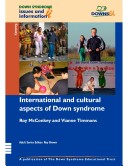Down Syndrome Issues & Information
1 total work
International and Cultural Aspects of Down Syndrome
by Roy McConkey and Vianne Timmons
Published 15 November 2004
Cultural influences impact on all our lives and this is no less true for people with Down syndrome. In this book, we describe various cultural responses to disability; we look at families and individuals with Down syndrome from a cross-cultural perspective and how best they can be supported, and we examine the form and functions of service systems that are culturally sensitive and appropriate. Within each of these three main sections, a particular topic is spotlighted to illustrate the practical implications of the points made. The content particularly addresses the needs of families with people with Down syndrome who are adults. Our aim is to make readers better informed about the life circumstances and experiences of people with Down syndrome and of their families throughout the world and not just within their own culture. We emphasise the need for sensitivity to the ways in which different cultures can respond to a person with Down syndrome and for greater tolerance of the different aspirations which families and communities have for these people.
We suggest new ways of assisting families to provide better opportunities for these young people to lead more fulfilled lives, wherever in the world they live. These need not entail a great deal of money but they do require persons willing to act as personal supporters. We propose means of finding such individuals. Finally, we urge a reappraisal of the type and range of services that are provided to people with Down syndrome so that their aspirations for friendships, employment and family life receive attention. However, these new forms of support services will only become fully successful when society's attitude to disability is transformed from primarily a medical problem to a social issue: from a specialist concern to a community focus and from a charitable ethos to one built on a shared humanity.
We suggest new ways of assisting families to provide better opportunities for these young people to lead more fulfilled lives, wherever in the world they live. These need not entail a great deal of money but they do require persons willing to act as personal supporters. We propose means of finding such individuals. Finally, we urge a reappraisal of the type and range of services that are provided to people with Down syndrome so that their aspirations for friendships, employment and family life receive attention. However, these new forms of support services will only become fully successful when society's attitude to disability is transformed from primarily a medical problem to a social issue: from a specialist concern to a community focus and from a charitable ethos to one built on a shared humanity.
